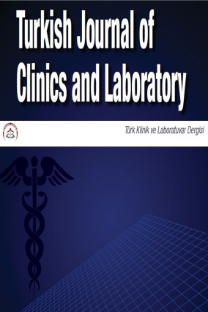Metronidazol tedavisine bağlı olarak lökopeni ve trombositopeni gelişen akut gastroenterit olgusu
Akut gastroenterit, metronidazol, lökopeni, trombositopeni, yan etki
Leukopenia and thrombocytopenia due to metronidazole treatment in a case with acute gastroenteritis
Acute gastroenteritis, metronidazole, thrombocytopenia, leukopenia, adverse effect,
___
- Ulutan F. Akut ishalli hastaya yaklaşım. Willke A, Söyletir G, Doğanay M (edi), Enfeksiyöz ishaller, Enfeksiyon Hastalıkları ve Mikrobiyolojisi, 3. baskı,Nobel Tıp Kitabevleri, İstanbul, 2008; s. 1045-1078.
- Ohniski K, Sakamoto N, Subjective adverse reaction to metronidazole in patients with amebiasis. Parasitology international 2014; 63:698-700.
- Jenks PJ. Nitroimidazoles, In: Antibiotic and chemotherapy, Roger G. Finch,David Greenwood,Richard J, Whitley,S. Ragnar Norrby (eds). 9nd ed.Philadelphia: Saunders Company; 2010: 292-300.
- Nagel JL, Aranoff DM. Metronidazole. Mandell, Bennett, Douglas (Eds), Principles and Practice of Infectious Diseases, 8th edi, Philadelphia, Saunders Company, 2015; 353-354.
- Vudalı E, Kınıklı S, Cesur S. Antibiyotiklerin yan etkileri. Turk J Clin Lab 2014; 5: 18-27.
- Gilbert D, Moellering RC, Eliopoulos GM, Chambers HF, Saag MS. The Sanford Guide to Antimicrobial therapy 2012; 42nd edition, p.97-106.
- Granowitz EV, Brown RB. Antibiotic adverse reactions and drug interactions. Crit Care Clin 2008; 24: 421-42.
- Smith JA. Neutropenia associated with metronidazole therapy. Can Med Assoc J 1980; 123: 202.
- Martin C, Ruperti A, Saux P, Brioche MI, Gouin F. Drug-induced agranulocytosis. Discussion of the responsibility of metronidazole. Ann Fr Anesth Reanim 1985; 4: 521-3.
- White CM, Price JJ, Hunt KM. Bone marrow aplasia associated with metronidazole. Br Med J 1980; 280: 647.
- McKendrick MW, Geddes AM. Neutropenia associated with metronidazole. Br Med J 1979; 2: 795.
- Gutiérrez García M, López Lunar E, Fernández Arenas O, Hidalgo Correas FJ, García Díaz B. Neutropenia induced by therapeutic doses of intravenous metronidazole. Farm Hosp 2009; 33: 231-3.
- Aster RH, Curtıs BR, Mcfarland JG, Bougıe DW. Drug-induced immune thrombocytopenia: pathogenesis, diagnosis, and management. J Thromb and Haemost 2009; 7: 911-8.
- ISSN: 2149-8296
- Yayın Aralığı: 4
- Başlangıç: 2010
- Yayıncı: DNT Ortadoğu Yayıncılık AŞ
Kırkkale, Türkiye’de doğal bitkisel ürünlerin kullanımı
SELDA FATMA BÜLBÜL, Gaye AŞIK, NURAY BAYAR MULUK
SERKAN TURSUN, GÖKÇE ŞİMŞEK, NURAY BAYAR MULUK
Çocukluk çağı obezitesinin kardiyak yapı ve fonksiyonlara etkisi
Fatih ATİK, Cihat ŞANLI, Ayça TÖREL ERGÜR, Ayşegül ALPCAN
Acil sağlık çalışanlarının çocuk istismarı ve ihmali hakkında genel bilgilerinin değerlendirilmesi
Mehmet ÖZEN, Hayri RAMADAN, Sevilay VURAL, Figen COŞKUN
Çocuk sporcularda fiziksel performans ile ağız ve diş sağlığı arasındaki ilişkinin değerlendirilmesi
SERDAR BAĞLAR, SİNAN AYAN, Hakan YAPICI, VOLKAN ARIKAN
Panaromik radyografide dentigeröz kiste benzeyen keratokistik odontojenik tümörün teşhis ve tedavisi
Alime OKKESİMA, MEHMET ZAHİT ADIŞEN, MELDA MISIRLIOĞLU, UMUT TEKİN
Metronidazol tedavisine bağlı olarak lökopeni ve trombositopeni gelişen akut gastroenterit olgusu
Özlem ÖZEL, Salih CESUR, Çiğdem ATAMAN HATİPOĞLU, Şerife ALTUN DEMİRCAN, Esra KAYA KILIÇ, Sami KINIKLI, Ali Pekcan DEMİRÖZ
